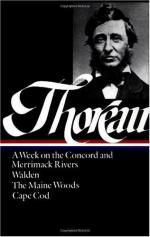As yesterday and the historical ages are past, as the work of to-day is present, so some flitting perspectives, and demi-experiences of the life that is in nature are in time veritably future, or rather outside to time, perennial, young, divine, in the wind and rain which never die.
The respectable folks,—
Where dwell they?
They whisper in the
oaks,
And they sigh in the
hay;
Summer and winter, night
and day,
Out on the meadow, there
dwell they.
They never die,
Nor snivel, nor cry,
Nor ask our pity
With a wet eye.
A sound estate they
ever mend
To every asker readily
lend;
To the ocean wealth,
To the meadow health,
To Time his length,
To the rocks strength,
To the stars light,
To the weary night,
To the busy day,
To the idle play;
And so their good cheer
never ends,
For all are their debtors,
and all their friends.
Concord River is remarkable for the gentleness of its current, which is scarcely perceptible, and some have referred to its influence the proverbial moderation of the inhabitants of Concord, as exhibited in the Revolution, and on later occasions. It has been proposed, that the town should adopt for its coat of arms a field verdant, with the Concord circling nine times round. I have read that a descent of an eighth of an inch in a mile is sufficient to produce a flow. Our river has, probably, very near the smallest allowance. The story is current, at any rate, though I believe that strict history will not bear it out, that the only bridge ever carried away on the main branch, within the limits of the town, was driven up stream by the wind. But wherever it makes a sudden bend it is shallower and swifter, and asserts its title to be called a river. Compared with the other tributaries of the Merrimack, it appears to have been properly named Musketaquid, or Meadow River, by the Indians. For the most part, it creeps through broad meadows, adorned with scattered oaks, where the cranberry is found in abundance, covering the ground like a moss-bed. A row of sunken dwarf willows borders the stream on one or both sides, while at a greater distance the meadow is skirted with maples, alders, and other fluviatile trees, overrun with the grape-vine, which bears fruit in its season, purple, red, white, and other grapes. Still farther from the stream, on the edge of the firm land, are seen the gray and white dwellings of the inhabitants. According to the valuation of 1831, there were in Concord two thousand one hundred and eleven acres, or about one seventh of the whole territory in meadow; this standing next in the list after pasturage and unimproved lands, and, judging from the returns of previous years, the meadow is not reclaimed so fast as the woods are cleared.




